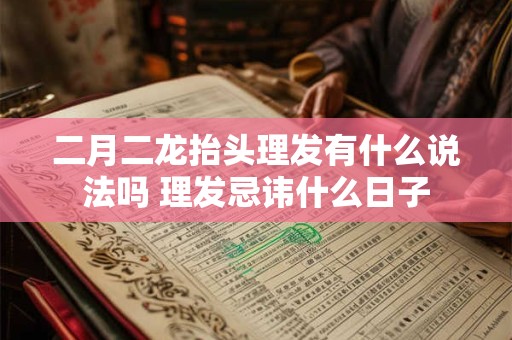February second, the day of the Dragon抬Head, is a traditional Chinese festival with a wealth of cultural connotations. Among the various customs, hair cutting is a significant part that many people pay attention to. This article will discuss the saying of cutting hair on the day of the Dragon抬Head and the taboos of hair cutting on certain days.
Dragon抬Head Hair Cutting Sayings
The saying "cutting hair on the second day of February, the day of the Dragon抬Head, can make one's hair grow healthier and faster" has been passed down from generation to generation. Many people believe that on this day, the Dragon神, who is in charge of water and agriculture, wakes up from hibernation and starts to work. Therefore, cutting hair on this day can bring good luck, make the hair grow more luxuriant, and symbolize the beginning of spring and the revival of nature.
Why is Dragon抬Head Important for Hair Cutting?
The Dragon抬Head festival is not only a traditional Chinese festival but also a very important day for agriculture. In ancient times, agriculture was the most important livelihood for people, and the Dragon神 was considered the god of water and agriculture. Therefore, people believed that on this day, cutting hair could make the crops grow better and bring good harvests.
Taboos of Hair Cutting on Certain Days
Although cutting hair on the day of the Dragon抬Head is considered auspicious, there are some taboos about hair cutting on other days. Let's take a look at some of these taboos.
1. Avoid Cutting Hair on the First Day of the Month
In traditional Chinese culture, the first day of the month is considered an auspicious day for starting new things. Therefore, cutting hair on this day is considered inappropriate as it may disrupt the good fortune and luck for the new month.
2. Avoid Cutting Hair on the 19th Day of the Month
According to traditional beliefs, the 19th day of the month is a day for gods and ghosts to inspect the world. Cutting hair on this day is considered to be disrespectful to the gods and ghosts, and it may bring bad luck.
3. Avoid Cutting Hair on the 23rd Day of the Month
The 23rd day of the month is also considered an inauspicious day for cutting hair. It is believed that cutting hair on this day may make one's luck decline and may bring misfortune.
The Science Behind Hair Cutting Taboos

Although these taboos are based on traditional beliefs, there is also some scientific basis for them. For example, cutting hair during certain phases of the moon can affect the hair's growth and health. Additionally, the weather and season can also affect hair growth and health.
Modern Attitudes Towards Hair Cutting Taboos
With the development of society and the improvement of people's living standards, more and more people are paying attention to the health and beauty of their hair. While some people still follow these traditional taboos, many others choose to cut their hair based on their own needs and preferences.
Conclusion
The Dragon抬Head festival and its associated hair cutting traditions are an important part of Chinese culture. While these traditions may seem superstitious to some, they carry valuable cultural significance and reflect the ancient Chinese people's respect for nature and their pursuit of a better life. Whether or not one chooses to follow these traditions, it is important to understand and appreciate the cultural heritage they represent.
